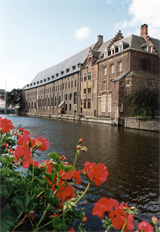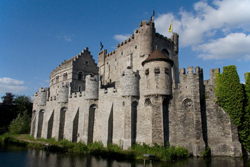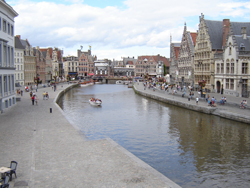International Congress
Crossing the border between Spanish and English:
current issues, future perspectives, linguistic and literary insights
This international congress is a joint initiative of the Research Group CROS of the Department of Spanish and Comparative Romance Linguistics at Ghent University (Belgium) and the Department of Linguistics and Literary Studies (Spanish language) at the Vrije Universiteit Brussel (Belgium).
The congress will take place at Het Pand (Ghent, Belgium) on February 5-6, 2019.
Plenary speakers
Linguistics: Kim Potowski (University of Illinois): “Mi español tiene hambre”: La pérdida de la lengua familiar (abstract)
Literary Studies: An Van Hecke (KU Leuven, Antwerpen): Vivir entre dos lenguas: construcción identitaria y bilingüismo en la autobiografía chicana (abstract)
Cultural Studies: Silvia Betti (Università di Bologna): “Mi Casa (Blanca) no es tu Casa (Blanca)”. El ‘efecto Trump’ en el español de los Estados Unidos (abstract)
Call for papers
The phenomenon of globalization includes an ever-increasing degree of contact between different languages and cultures. This congress wants to study concrete consequences of contact between the Spanish and English languages and cultures in different areas. From a linguistic viewpoint, contact between English and Spanish may occur at various levels among which there are: lexical borrowings, lexical and syntactic calques, and codeswitching. In Spain, there is a growing presence of English in mass media, education etc. and hence an increasing influence of the Anglo-Saxon language and culture. The linguistic outcomes have been the subject of some controversy: some believe that the effect on Spanish syntax and semantics is real, especially among younger generations, whereas others situate the impact mostly at the level of the lexicon (thus lexical borrowings, Stewart 1999). Another particular case in point constitutes what is commonly defined as Spanglish. The continuing migrations of Hispanics towards the North have changed the profile of the US, not only from a cultural, social and economic viewpoint, but also because of the linguistic contact between English and Spanish. Over the last decades, the study of Spanglish has become an increasingly popular topic, although the phenomenon has triggered numerous and, at times, emotionally charged debates involving negative and positive attitudes toward the phenomenon itself, the terminology (‘Spanglish’ versus ‘espanglish’ or ‘popular Spanish of the US’), and its linguistic status (Spanglish as a new language or a dialect). Besides being a communicative practice, for many Latinos it constitutes a part of their multicultural identity. The research group CROS kindly invites interested researchers to present their work relating to the following issues:
1. Spanish in contact with English in Spain
The conference wants to contribute to the ‘measurement’ of the impact of English on Spanish, at various linguistic levels.
- Is it mostly to be situated in the domain of lexical borrowings, or can concrete cases of impact on Spanish syntax be identified?
- Can one observe a changing impact, for instance by the analysis of a particular phenomenon through different micro-diachronies?
- Is it true that the impact is to be situated among adolescents and younger generations?
Although proposals including theoretical reflections and all kinds of concrete topics are accepted, we particularly welcome case studies on syntactic borrowings and calques (e.g. studies on the gerund, prepositional uses, and other constructions which may have changed as a consequence of Spanish-English language contact).
2. Spanish in contact with English in the USA
Spanglish has rightly been treated as a socially, politically and culturally relevant research domain and has been the topic of many sociolinguistic studies. However, much less is known on what really happens in the minds of Spanglish speakers. This workshop wants to provide an interdisciplinary approach to the phenomenon (Rodríguez-González & Parafita Couto 2012), by combining linguistic and literary insights, and within each discipline by integrating different viewpoints. Although proposals including all approaches and topics about Spanglish (or Spanish spoken in the U.S.) are accepted, the following research domains can be defined.
From a linguistic viewpoint, the conference aims at further identifying the characteristics of Spanglish as a unique form of bilingualism, by adopting various perspectives:
- It particularly welcomes concrete case studies of Spanglish grammar (e.g. on phenomena of word order, discourse markers etc.). These could contribute to the general question of whether the image of linguistic chaos (González Echevarría 1997) can be replaced by the model of Spanglish as a ‘a third linguistic system’, rule-governed and full of remarkable regularities (Betti & Enghels in Press; Silva-Corvalán & Potowski 2009).
- We also particularly welcome papers that discuss the construction of corpora: What kind of empirical data can be used in order the study the phenomena? As such, the conference ties up with a more general discussion on the value of written data to study phenomena typical of orality. Should written multilingual texts be treated as a discourse genre in its own right and do they constitute a valuable source of information on how bilinguals make advantage of their enriched linguistic system in order to perform and translate highly complex cognitive tasks?
- It also wants to discuss the main challenges Spanglish is expected to be confronted with in the (near) future given that, more than ever, the identity of its speakers in the USA is at stake.
From a literary point of view, the following research topics can be discussed:
- How to write a territorialized national identity where notions of homeland, native language (mother tongue), and cultural belongings are affected by the crossing of borders? How does writing attempt to reconfigure the links between the author and his/her origins? How and what else is around the writing of the ambivalent sense of belonging? To do so, some suggested areas and topics of exploration (non-exhaustive) are:
- Self-experience writing: Autobiography, Autofiction, Testimonial literature.
Personal Geographies: Experiencing ‘nostos’ (return to the homeland), longing for home.
Images of nostalgia and in-betweenness.
In the search of roots and routes.
Borders and Boundaries.
Women writing.
We invite the submission of abstracts for full papers. Abstracts for an oral presentation (20 minutes + discussion time) must not exceed 500 words, including references, and should mention the main research question(s), methodology, data and (expected) results.
Abstracts will have to be submitted individually and will be reviewed anonymously. Please submit via Easychair through https://easychair.org/conferences/?conf=cros2019.
The conference languages are Spanish and English.
Important Dates
- 15.08.2018: Abstract submission deadline
- 30.10.2018: Notification to authors
- 30.11.2018: Final program publication
- 05-06.02.2019: Congress
Programme and abstracts
The final program (version 01/02/2019) can be found here.
El cuaderno de resúmenes se puede consultar aquí.
Registration
- Early bird registration (until December 31): 60€
- Registration from January 1st: 80€
- Registration includes all coffee breaks and two cold lunches
- On the night of February 5th there will be a conference dinner (50€) in the restaurant Brasserie Ha’. More information will be provided soon.
- IMPORTANT NOTICE FOR UGent & VUB STUDENTS
- participation is free of charge for UGent and VUB students
- those students who just want to attend the conference without participating in the coffee breaks, lunches etc. should just send a message @ cros.ugent.be
- if you would also like to participate in the lunches, coffee breaks and diner, you will have to register through the official form and pay the regular fee.
Publication
We intend to publish a special journal issue of selected papers from the workshop. More details can be found here.
Venue
 The conference will be held at “Het Pand”, the Cultural Centre of Ghent University. “Het Pand”, a former Dominican monastery, is located in the historical centre of the city, on the banks of the river “Leie”. The oldest parts of this impressive building date from the 13th century. During five centuries it was extended and refashioned in different styles. Since its rehabilitation and restoration, finished in 1991, “Het Pand” has been offering a wide range of possibilities for the organisation of scientific congresses and cultural events. “Het Pand” houses some valuable collections, such as the rich ethnographical and archaeological collections of the university, the Museum for the History of Medicine, full-size photographs of paintings of Brueghel and Early Flemish Masters, and an interesting collection of stained glass.
The conference will be held at “Het Pand”, the Cultural Centre of Ghent University. “Het Pand”, a former Dominican monastery, is located in the historical centre of the city, on the banks of the river “Leie”. The oldest parts of this impressive building date from the 13th century. During five centuries it was extended and refashioned in different styles. Since its rehabilitation and restoration, finished in 1991, “Het Pand” has been offering a wide range of possibilities for the organisation of scientific congresses and cultural events. “Het Pand” houses some valuable collections, such as the rich ethnographical and archaeological collections of the university, the Museum for the History of Medicine, full-size photographs of paintings of Brueghel and Early Flemish Masters, and an interesting collection of stained glass.
A small map with the location of ‘Het Pand’ can be found here.
The City of Ghent
 Ghent or Gent (in Dutch), lies in the heart of Flanders, between Bruges, Antwerp and Brussels. Its rich heritage has shaped the city into a living museum with a “medieval skyline”. It is by no means a coincidence that Ghent is often referred to as the historic heart of Flanders, a city of all times, and as one of the most beautiful historic cities in Europe. The city is after all a combination of an imposing past with a lively present. Not only the lovers of art and culture make their tricks in Ghent: also if you like to go shopping for a day, enjoy a good meal or have an entertaining night out, Ghent offers everything you require.
Ghent or Gent (in Dutch), lies in the heart of Flanders, between Bruges, Antwerp and Brussels. Its rich heritage has shaped the city into a living museum with a “medieval skyline”. It is by no means a coincidence that Ghent is often referred to as the historic heart of Flanders, a city of all times, and as one of the most beautiful historic cities in Europe. The city is after all a combination of an imposing past with a lively present. Not only the lovers of art and culture make their tricks in Ghent: also if you like to go shopping for a day, enjoy a good meal or have an entertaining night out, Ghent offers everything you require.
Ghent is an often neglected jewel when it comes to visiting Flanders, the Flemish speaking region of Belgium. Most visitors focus on Antwerp, Bruges or Brussels. But in doing so, they miss the opportunity to discover a city with a strong historical background that goes back to the Middle Ages. The city has been on the cross road of many political and economical shifts in the Western European context. Spanish, Austrian, German, Dutch, French, English,… have influenced the Ghent history and left behind traces, thus enriching a cultural heritage that reflects a unique blend of styles, traditions, architecture, and culinary trends.
 The city prospered due to the textile trade, and was one of the largest cities in Western Europe. Visiting kings envied the cultural patrimony and had to cope with the stubborn nature of citizens that strongly defended their autonomy. The city has evolved from a variety of settlements on the banks of the River “de Leie” and “de Schelde”.
The city prospered due to the textile trade, and was one of the largest cities in Western Europe. Visiting kings envied the cultural patrimony and had to cope with the stubborn nature of citizens that strongly defended their autonomy. The city has evolved from a variety of settlements on the banks of the River “de Leie” and “de Schelde”.
The city nearly equals Bruges when it comes to the number of museums, canals and bars. It offers a larger variety when it comes to contemporary art, theatres, and concert halls. Your list of “things to see” should include the medieval Gravensteen Castle, the belfry, the cathedral with the famous painting of the brothers Van Eyck “The Adoration of the Mystic Lamb”, the St. Nicolas Church, the three beguinages, monasteries, etc.
Nowadays Ghent is an economical centre due to its renowned international port and a cultural centre due to the large concentration of educational institutes, varying from the Ghent University, the largest concentration in Flanders of higher professional education institutes, to secondary and primary schools.
Travel
A description of how to get to Ghent from Brussels National Airport can be found here.
Accommodation
Here is a list of good hotels in Gent, but of course, there are many more options for accommodation in the historical center of Ghent, at a walking distance from the conference location.
Hotels
Novotel Ghent Centre (110-130€/night)
NH Hotel Belfort (110-130€/night)
Hotel Gravensteen (80-130€/night)
Best Western Chamade (95-140€/night)
Ibis Gent Centrum Opera (80-130€/night)
B&B’s
http://www.gent-accommodations.be/
http://www.bedandbreakfast.be/bed_and_breakfast/in/Belgium/Oost-Vlaanderen/Gent/
http://www.charmio.com/en/region/ghent
Hostel
Uppelink (23-65€/night)
Organizing Committee
- Renata Enghels (Ghent University)
- Diana Castilleja (Vrije Universiteit Brussel)
- Miriam Bouzouita (Ghent University)
- An Vande Casteele (Vrije Universiteit Brussel)
- Kim Collewaert (Vrije Universiteit Brussel)
- Linde Roels (Ghent University)
- Marie Comer (Ghent University)
Scientific Committee
- Renata Enghels (Ghent University)
- Diana Castilleja (Vrije Universiteit Brussel)
- Miriam Bouzouita (Ghent University)
- An Vande Casteele (Vrije Universiteit Brussel)
- Silvia Betti (Università di Bologna)
- Ilse Logie (Ghent University)
- An Van Hecke (KU Leuven, Antwerpen)
- Eugenia Houvenaghel (Universiteit Utrecht)
- Kim Potowski (University of Illinois at Chicago)
- Nadia Lie (KU Leuven)
- Kim Collewaert (Vrije Universiteit Brussel)
- Linde Roels (Ghent University)
- Marie Comer (Ghent University)
Contact
Further information contact: cros@ugent.be
Find us on the Sociolinguistic Events Calendar: https://baal.org.uk/resources/slxevents.